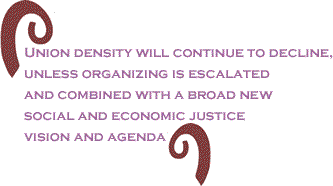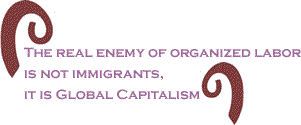
|
|||||||||||||||||||||
 |
|||||||||||||||||||||
 |
|||||||||||||||||||||
 |
|||||||||||||||||||||
 |
|
|
"The essence of trade unionism is social uplift.
The labor movement has been the haven for the dispossessed, the
despised, the neglected, the downtrodden, the poor." When A. Phillip Randolph spoke the above words during the 20th century, he was the leader of the Brotherhood of Sleeping Car Porters. The Brotherhood of Sleeping Car Porters was a union mainly of African American workers. Other unions refused to organize African American workers and accused African Americans of taking jobs, lowering wages and strikebreaking. Today’s labor movement is faced with some of
the same challenges, should we organize the dispossessed, the neglected,
downtrodden and the poor? Should we organize In 1955, organized labor was 35% of the workforce, today it is only 12.5% of the workforce. Technological changes, combined with the moving of work abroad and other factors has contributed to the decimation of union density. High wages and benefits cannot be sustained for any union as long as undocumented immigrant workers, African Americans, Latinos and the poor remain outside the organized labor movement. Union members should be tireless supporters of the immigrant rights movement and advocate support for civil and human rights struggles. Standing along side undocumented workers, for civil and human rights should be seen as a badge of honor in unions and not issues that organized workers reluctantly support. But this will not happen unless discussion, debate and education takes place at the deepest roots of the Labor Movement. Avoiding discussions and debates on immigrant rights, and organizing the poor and workers of color, will only lead the Labor Movement further and further into self-centeredness and decline. While expanding union-worker membership is important, we must stand firmly on the side of those in the fight for social and economic justice, concretely this means supporting the rights of undocumented immigrant workers, African American workers, Latinos, women, and the poor. The organized Labor Movement must do more than fight for the rights of union members. Masses of people, most are workers, many are women and workers of color, all are being forced into poverty. Organized labor cannot win in a fight with Global Corporations without allies from other exploited and oppressed classes and communities. Does The Organized Labor Movement Have Enemies? Many union members have been educated to believe that the system of Global capitalism supports the existence of trade unionism and will assist hard working American workers. Workers have been taught that problems in the organized labor movement exist because we just have some bad employers.
Today’s Global Capitalist and neo-liberals see unionism as their class enemy and are committed to putting the nails in the coffin of organized labor. Shallow discussions among union members about bad employers will not raise the level of awareness of workers concerning the true nature of the problems that workers and the oppressed are facing. Intense, deep and substantive discussions need to be held at work sites, schools and communities about immigration reform and rights. Avoiding the discussion on immigration reform will only contribute to further weakening of the organized labor movement, the attacks on immigrants and the erosion of worker/civil and human rights. The real enemy of organized labor is not immigrants, it is Global Capitalism. Global Capitalism continually drives workers from poorer countries abroad, displaces more workers and forces them into deeper and deeper poverty. Immigrant Rights Are Workers' Rights Immigrants are fighting for basic rights, such as the right to organize, equal wages and benefits and a path to citizenship without obstacles and more. Immigrant bashing, violence, exclusion and discrimination is as deadly as White Supremacy. Make no mistake, these attacks are meant to crush the spirit and subjugate and neutralize union and unorganized workers. The Labor Movement has an opportunity to rise up and play a leading role in the fight for the rights of immigrants. And, the Labor Movement should never forget the unfinished business of organizing and fighting for the rights of the millions of African American workers and Latino workers in the South and Southwest. Karega Hart is a member of the Bay Area
Black Radical Congress and a Labor Activist in the Oakland/San-
Francisco, California area. Click
here to contact Mr. Hart. |
|
| Home | |
| December 14, 2006 Issue 210 |
||||||||||||||
|
||||||||||||||
| Printer Friendly Version in resizeable plain text format | ||||||||||||||
 |
||||||||||||||
|
||||||||||||||
 |
||||||||||||||
 |
||||||||||||||
 |
||||||||||||||
 |
||||||||||||||
| |
||||||||||||||
| |
||||||||||||||





























